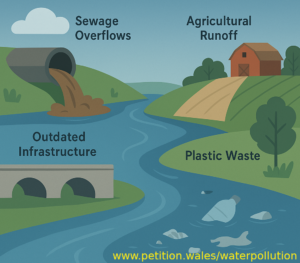Dŵr Cymru (Welsh Water) plays a crucial role in providing clean water and wastewater services across Wales. As a not-for-profit organization, it is tasked with ensuring that the water supply is safe for drinking, agricultural use, and recreation. However, despite its significant responsibilities, there are ongoing concerns about the company’s handling of water pollution. While Welsh Water has made efforts to manage the issue, there is a growing need for the company to do more to protect Wales’ water resources and the environment. Here are the key reasons why Welsh Water should take more decisive action.
1. Sewage Overflows: A Growing Problem
One of the most prominent issues facing Welsh Water is the frequent use of sewage overflows during heavy rainfall. Storm overflows are designed as emergency measures to prevent the sewage system from backing up. However, when these overflows occur, untreated or partially treated sewage is released into rivers and coastal waters. This can cause significant damage to water quality, harm aquatic life, and pose a threat to public health.
While storm overflows are allowed under current regulations, they have been increasingly used, and many communities are frustrated by their frequency. These discharges often lead to pollution of local beaches, rivers, and recreational areas, impacting the local economy and the well-being of communities. Welsh Water has a responsibility to invest in modernizing sewage infrastructure to reduce the occurrence of overflows and prevent untreated sewage from entering the environment.
2. Agricultural Runoff: A Persistent Pollutant
Agricultural runoff remains one of the most persistent sources of water pollution in Wales. Fertilizers, pesticides, and animal waste from farming can easily wash into nearby rivers, lakes, and groundwater, causing contamination. These pollutants can lead to nutrient overload in water bodies, resulting in harmful algal blooms, oxygen depletion, and fish kills. The effects of agricultural runoff not only harm aquatic ecosystems but also degrade the quality of drinking water supplies.
Welsh Water has made some efforts to work with farmers and encourage more sustainable agricultural practices, but the issue persists. The company needs to do more to address this pollution source, especially by strengthening its collaboration with the agricultural sector, advocating for sustainable farming practices, and encouraging better land management techniques to minimize runoff.
3. Outdated Infrastructure: A Barrier to Effective Pollution Control
Many areas of Wales still rely on outdated water and sewage infrastructure that is not equipped to cope with the challenges posed by modern climate conditions. Increased rainfall due to climate change, alongside population growth and urbanization, places additional pressure on existing systems. As a result, the capacity to treat wastewater and manage stormwater is often exceeded, leading to more frequent discharges of untreated sewage.
While Welsh Water has acknowledged the need for investment in infrastructure improvements, progress has been slow. The company must accelerate its efforts to upgrade its sewage and wastewater treatment systems. By modernizing infrastructure and investing in climate-resilient solutions, Welsh Water can reduce the risk of pollution events and improve water quality across the region.
4. Plastic and Other Waste in Our Waterways
Plastic pollution is an ever-growing problem worldwide, and Wales is no exception. Single-use plastics, including bottles, bags, and microplastics, continue to pollute rivers, lakes, and coastal areas. These pollutants not only harm aquatic life but also enter the food chain, posing potential health risks to both wildlife and humans. While Welsh Water has made efforts to reduce plastic waste and encourage recycling, more can be done to combat this issue.
Welsh Water should take a more proactive approach to tackle plastic pollution by supporting initiatives to reduce plastic waste, including better waste management practices and educational campaigns. It can also work closely with local governments, environmental organizations, and communities to reduce plastic litter that inevitably ends up in the water system.
5. Public Health and Economic Impact
The effects of water pollution go beyond environmental damage—they can also have significant public health and economic consequences. Contaminated water supplies can lead to waterborne diseases, gastrointestinal illnesses, and skin infections, which place a burden on the healthcare system. Polluted rivers and beaches can also harm local economies that depend on tourism, fishing, and recreational activities.
As a service provider responsible for maintaining public health, Welsh Water must prioritize the protection of water quality. Ensuring that clean water is available for all, and reducing the risks associated with pollution, should be at the heart of the company’s strategy. The company has a duty to protect the health of local communities and support the economic sustainability of the regions it serves.
6. Public Perception and Accountability
Public perception of Welsh Water has been impacted by ongoing water pollution incidents. People are frustrated by the continuing pollution of rivers and beaches, and many feel that Welsh Water is not doing enough to address the problem. When sewage overflows occur or when plastic waste is found in local waterways, it undermines trust in the company’s ability to safeguard the environment and public health.
Welsh Water needs to be more transparent and accountable in its efforts to tackle water pollution. Clear communication about the measures the company is taking, along with more ambitious goals to reduce pollution, will help restore public confidence and demonstrate a commitment to protecting Wales’ water resources.
 Conclusion: A Call for Action
Conclusion: A Call for Action
While Dŵr Cymru (Welsh Water) has made some progress in addressing water pollution, there is still much more to be done. The company has a vital role to play in safeguarding the health of Wales’ water resources, protecting the environment, and ensuring the well-being of its communities. The rising frequency of sewage overflows, the persistence of agricultural runoff, outdated infrastructure, and plastic waste are all challenges that require urgent action.
Welsh Water must prioritise investment in modernizing sewage systems, collaborate more effectively with the agricultural sector to reduce runoff, address plastic pollution more aggressively, and take proactive steps to safeguard public health and the environment. By doing more to tackle these issues, Welsh Water can help ensure that future generations inherit a cleaner, healthier Wales.
It’s time for Welsh Water to step up its efforts and protect the water that is so vital to life in Wales.
Welcome to www.network.wales
We’re your new go-to platform for connecting communities across Wales—through local news, petitions, events, and meaningful conversations.
Have something to share?
Whether you're passionate about writing, have a story to tell, or just want your voice heard, we’d love to hear from you! Contact Us Here or email: [email protected]




